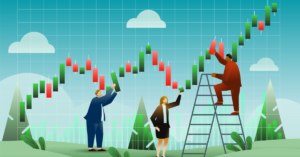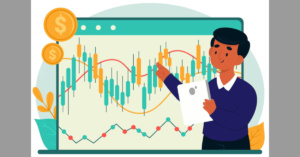Lately, a significant quotient of people from different places are getting into trading as a career since it’s become extremely popular. We’re seeing people enter into everything from stocks and forex to commodities and even crypto—all because trading can make a lot of money, and you can somewhat set your own schedule.
But–or more appropriately, nevertheless– before you delve into it, trading isn’t only primarily focused on making money without effort. This career has its fair share of ups and downs. In this helpful post, we’re going to tackle the good and the bad of going professional in trading to figure out if it fits what you’re looking for.
Understanding the Trading Landscape
Trading is primarily focused on trying to make money by buying and selling items, like stocks or even bonds, on different places like markets or those antiquated stock exchanges. Now, because of all the technology we’ve got, essentially anyone with a phone or laptop can start trading right from their couch.
But, and this is a major but, just because you can start doesn’t mean you’re going to earn a lot of money. It actually takes a lot of intelligence, some serious skills, and really becoming familiar with how the market moves. Perhaps of note (at least to certain readers), we should first understand what trading’s really about.
It’s not simply pressing some buttons and seeing money come in.
Pros of Making Trading a Career
-
Flexibility and Independence
I believe, as you might hold credence also, that having the choice to set your own hours — pick the spot you want to work from — and decide on which markets to enter into, is extremely appealing in a trading career. This freedom means you can actually have a life outside work, which sounds significantly better than sticking to a boring 9-to-5 job.
Traders get to control much of what they do, and that’s something really unique about this path.
For people who really enjoy being independent, trading stocks and the like can be pretty wonderful. It’s primarily focused on making your own decisions. So, you could be making deals in your neighborhood early in the morning, or maybe even catching some late-night activities, depending on what markets you’re into.
With a bit of smarts, a discerning reader, such as yourself, will surely comprehend that this sort of freedom is what makes trading so attractive.
-
Potential for High Earnings
A significant quotient of people think about trading as a career because they can make a significant quotient of money quickly, especially when the market’s unfocused. You can get large profits if you’re good at it; there can possibly be gratification in your knowing that the chance to earn a lot of money is a major reason why many choose to trade.
If you really comprehend how the market moves and you’re intelligent and informed about it, we can take as a fervent certainty that the money can be large. It might seem a bit scary, since there’s a major chance of losing cash when you’re aiming for top-dollar returns–but for the traders who seriously work on their approach and figure out solid strategies, the effort can pay off in a big way.
-
Continuous Learning and Development
In the concentrated environment, or world, of trading, you must keep learning and changing your strategies because everything keeps shifting. There are several items such as economic indicators, geopolitical events, and how people feel about the market that can reconfigure things.
It’s essentially a big puzzle that constantly rearranges itself. But that’s what makes it interesting to traders. They enjoy figuring out fresh methods to approach the market. And the good news is, there are numerous ways to improve at this. You can hone your approach by taking online classes and joining trading communities.
For anyone interested in trading, the reader will quickly discover that it is all about remaining on your toes and soaking up as much information as possible.
-
Diverse Opportunities
There’s a lot to look into in trading, not simply stocks. You have many choices like forex, commodities, options, and even stocks. This mix lets people focus on areas they really like or know a lot about. In addition you can explore different trading styles, whether that’s day trading, swing trading, or going for the long haul with investing.
By finding what suits you best, one may immerse themselves in the knowledge that they’re shaping their trading journey around what they’re good at and what they like — boosting the odds of doing well.
-
Emotional Resilience and Personal Growth
You may be a little unsure that trading not simply tests your ability to be great under pressure but also builds some pretty important skills. Discipline, patience, and dealing with stress are key to making it as a trader. As you get better, you learn things such as how to make good decisions, manage risks, and keep your emotions in check.
These are useful not only in trading, but in other aspects of life, improving your ability to deal with obstacles that arise. The path to being a top trader also provides a substantial component of personal improvement, making you more capable in both your career and your daily life..
Cons of Making Trading a Career
-
High Risk and Potential Losses
The financial markets are extremely volatile, which means prices can go up very quickly, causing traders to run into losses they didn’t see coming. It’s extremely important for anyone getting into trading to know from the start that, along with the chance to make a significant quotient of money, there’s a high risk of losing a large amount, too.
A significant quotient of the time, new traders end up losing money, particularly if they join in without the right knowledge or a strong plan for their trading. Actually, it’s very simple to lose all your investment if you’re not paying close attention.
A discerning reader may begin to register that using intelligent and informed risk management steps and really understanding the dangers is the way to go when trading.
-
Emotional Stress and Pressure
Trading very quickly can essentially stress people out very much. Because you must make choices very fast, being scared of losing money messes with how you decide items; this pressure to decide fast is inherently, or in substance, similar to being in a very difficult game where you can’t focus clearly.
When you trade out of fear or desire, you are more likely to make poor decisions and lose a lot of money.
Managing emotions is an important aspect of trading success. Many traders face mental and emotional stress, which can cause burnout or anxiety.
-
Need for Continuous Learning
Getting to know content non-stop might seem marvelous at first–but It can turn out to be a disappointment too. Do you want to know the reason? Because the financial markets are always changing. Keeping up with all that new material means you must keep learning and that’s going to use up a significant part of your time.
In addition this path to discovery and discernment is not a walk in the park. It can really stress some people out. Also, you must become familiar with new tools, ways to do things, and how the financial world works now, which is hard if you’re already busy or just don’t feel like chasing after more knowledge.
-
Lack of Job Security
Trading isn’t the usual 9-to-5 job where you’re sure about what you’re going to make. Your earnings could change a lot, moving up and down from one month to the next, which makes it hard to keep your bank balance steady. If you have bills to pay, like for a family or home, this uneven income can be a real worry.
Traders often go through times when they’re doing very well, only to lose money later, leaving them with a changing paycheck. Having a plan for your finances is extremely important if you’re going to tackle the ups and downs that come with trading, but—or, more appropriately, nevertheless—it’s something several people forget to do.
-
Isolation
Many traders feel isolated because they work from home, solo. Getting to know other traders is tough but doing so can lessen that lonely feel. This is extremely clear when you look at it: cooping yourself up at home alone isn’t something everyone likes, especially for people who really enjoy working with others.
The concrete and clear culmination of this is having to really get in the area on your own and hustle to make those connections with others in the trading world.
Conclusion
Thinking about trading as what you want to do for work, it’s started some spectacular things for it and also some not-so-great parts. You can make a significant amount of money, and you got this nice freedom where you can basically make your own schedule.
In addition, you get to learn a large amount of material about the market and yourself, which is pretty amazing. But, wait a moment – it’s not all bright and happy. Trading can mess with your feelings a lot, and the chance of not having a stable job can be pretty scary.
And losing money? That’s a real risk too.
Before joining in, you really must think hard about the good characteristics and the bad characteristics of going down this road. The undertaking aims to lay it out: that, if you do decide to put your full effort, you should have a good plan of action — know your material by learning all you can — and figure out how to avoid losing all your money when things go bad.
In the end, picking trading as what you want to do for a living must feel well with who you are, how wonderful you are with taking risks, and the way you want to spend your time. If you have what it takes to figure out the market’s absurd moves, trading could end up being a very rewarding job for you.




